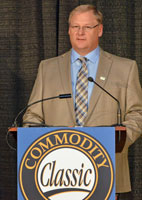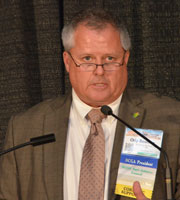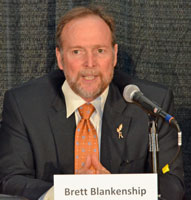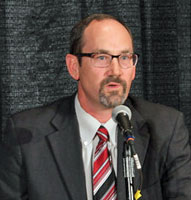 Trade, taxes, biotechnology, farm policy and government regulations are the main issues of concern to the commodity organizations who make up the Commodity Classic. Leadership of the American Soybean Association (ASA), National Corn Growers Association (NCGA), National Association of Wheat Growers (NAWG), and National Sorghum Producers (NSP) all held press conferences Thursday to talk about their top priorities.
Trade, taxes, biotechnology, farm policy and government regulations are the main issues of concern to the commodity organizations who make up the Commodity Classic. Leadership of the American Soybean Association (ASA), National Corn Growers Association (NCGA), National Association of Wheat Growers (NAWG), and National Sorghum Producers (NSP) all held press conferences Thursday to talk about their top priorities.
Under the category of biotech, ASA president Wade Cowan of Texas says they plan to promote a national certified non-GMO label for consumers who want to know. “It doesn’t help consumers if they have a label that says from one tenth to 100% is GMO – 99% of things on the shelf would have a GMO label,” he said.
ASA chairman Ray Gaesser got into more details about their ideas on GMO labeling and first Vice president Ray Wilkins discussed the organizations trade priorities. [wpaudio url=”http://www.zimmcomm.biz/commodity-classic/classic15-asa-press.mp3″ text=”Classic ASA press conference”]
 NCGA president Chip Bowling also talked about biotechnology and trade issues. “We will fight to remove trade barriers and expand overseas markets for US corn. We will support trade promotion authority legislation and normalization of trade with Cuba, a market with great potential for US corn and corn products.”
NCGA president Chip Bowling also talked about biotechnology and trade issues. “We will fight to remove trade barriers and expand overseas markets for US corn. We will support trade promotion authority legislation and normalization of trade with Cuba, a market with great potential for US corn and corn products.”
[wpaudio url=”http://www.zimmcomm.biz/commodity-classic/classic15-ncga-press.mp3″ text=”Classic NCGA press conference”]
The new president of NAWG is Brett Blankenship of Washington who stressed the importance of trade to wheat farmers particularly in his region of the country. “I farm in the Pacific Northwest and the PNW states are trade dependent, and the percentage of wheat exported out of the PNW is closer to 90% of production,” he said, compared to the 50% average nationwide. “The Pacific Rim countries are vital.”
[wpaudio url=”http://www.zimmcomm.biz/commodity-classic/classic15-nawg-press.mp3″ text=”Classic NAWG press conference”]National Sorghum Producers discussed the increased demand for sorghum in export and food markets; export markets represent 52% of the total market share for sorghum. NSP and Sorghum Check-off representatives stressed the importance of increasing sorghum acres to fulfill demand, and the opportunities that creates for growers. Speaking on behalf of the NSP board, CEO Tim Lust says “The demand today far exceeds the supply. From a checkoff standpoint, our goal is to continue to create these opportunities.” Sorghum usage in today’s food market is also a rapid growth area for the sorghum industry.
[wpaudio url=”http://www.zimmcomm.biz/commodity-classic/classic15-sorghum-press.mp3″ text=”Classic NSP press conference”]




